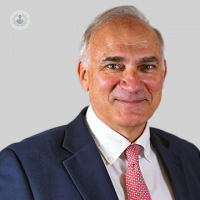What age should screening for cervical cancer begin?
Escrito por:The highest incidence of cervical cancer in the UK is in young women between the ages of 25 and 30. Sadly, the incidence of cervical cancer in the UK has increased by 50% since the first screening age was increased to 25 from 20 years of age. Hence, many have argued that there is little sense to start screening from age 25. Mr Angus McIndoe, a renowned obstetrician and gynaecologist, explains why cervical screening from a younger age is so important.
What is cervical screening?
Cervical screening is designed to detect precancerous abnormalities in the skin of the cervix before they become cancers. We know that these precancerous abnormalities are usually present for a number of years before they develop into cancers. Therefore, the design of a program to prevent cancers in 25 to 30 year olds would logically not start at 25, but 5 years younger at age 20.
The largest study on the reliability of cervical smears suggests that one smear test only picks up half of the women that have abnormalities in the cervix. The reason that the cervical smear program is so effective at reducing cervical cancer is that most precancerous abnormalities last for many years before they become a cancer, and after a number of smears, the chance of an abnormality being missed has been reduced a lot.
Why does cervical screening currently start at age 25?
The screening age in the UK was increased from 20 to 25 because statisticians argued that young women did not seem to be protected from cervical cancer by only one or two smears. The hypothesis was that, for some reason, smears did not seem to work in young women, however, no explanation for this hypothesis has ever been given. The screening age was increased to 25 with the expectation that a single smear at 25 would protect 25 to 30 year olds from cancer, although it was already known that this did not seem to work in younger women.
Since the screening age has been increased from 20 to 25, the incidence of cervical cancer in 25 to 30 year olds has increased by 50%. However, the screening establishment has published papers arguing that the increase in cancer in this age group is not because of the change in the screening program, but because of changes in sexual practice of young women. These arguments seem hollow in the light of what we know about smear tests and the natural history of cervical cancer.
Why cervical screening should start at age 20
Having the first screening at age 25 runs the risk of some women having already developed cancer by the time they have their first smear. As a result, instead of a simple outpatient procedure to remove a precancerous abnormality which preserves their fertility, they will then need to undergo a radical hysterectomy or radical radiotherapy, both of which result in infertility and the inability to have children.
Another reason why it is advised to start screening before age 25 is the concern of overtreatment. Currently, if a high-grade lesion known as a CIN2 is detected, research indicates that healthcare professionals will jump to treat this abnormality. However, what is characteristic about this type of abnormality is its extremely high likelihood of regression within two years without treatment. Hence, treatment here is unnecessary, and doing so risks complications such as increased risk for premature delivery in subsequent pregnancies. This approach is rather like an ostrich putting its head in the sand and hoping for the best. A better approach would be to observe such abnormalities carefully and to only treat them if the risk of progression is high.
What about the HPV vaccine?
The human papilloma virus (HPV) vaccine is available in the UK for free from the NHS to girls aged 12 to 18 years and helps protect them against cervical cancer. In fact, the vaccine has the possibility of reducing the risk of cervical cancer in those vaccinated by 50%. In schools, the first vaccination is offered in year eight or nine, and the second 6-12 months after the first. However, many young girls still do not take the opportunity to be vaccinated and even in those that are vaccinated, screening is still important as the risk is only reduced by 50%.
A new initiative that has been introduced is using HPV screening as a primary screening test instead of a cervical smear test. It is thought that first testing for HPV can eliminate women from a current risk of cervical abnormalities. However, many women who screen positively for HPV won’t have precancerous abnormalities, so effective secondary screening is important to get right to ensure that any changes in the cervix are detected down the line.
What advice do you have for young women?
My advice for young women is to ensure that they are vaccinated and to begin cervical screening at about 20 years of age. Screening should begin younger if they experience sexual intercourse significantly earlier than 18 years of age.
If you are concerned about cervical cancer, HPV or having a cervical screening, make an appointment with a specialist.



